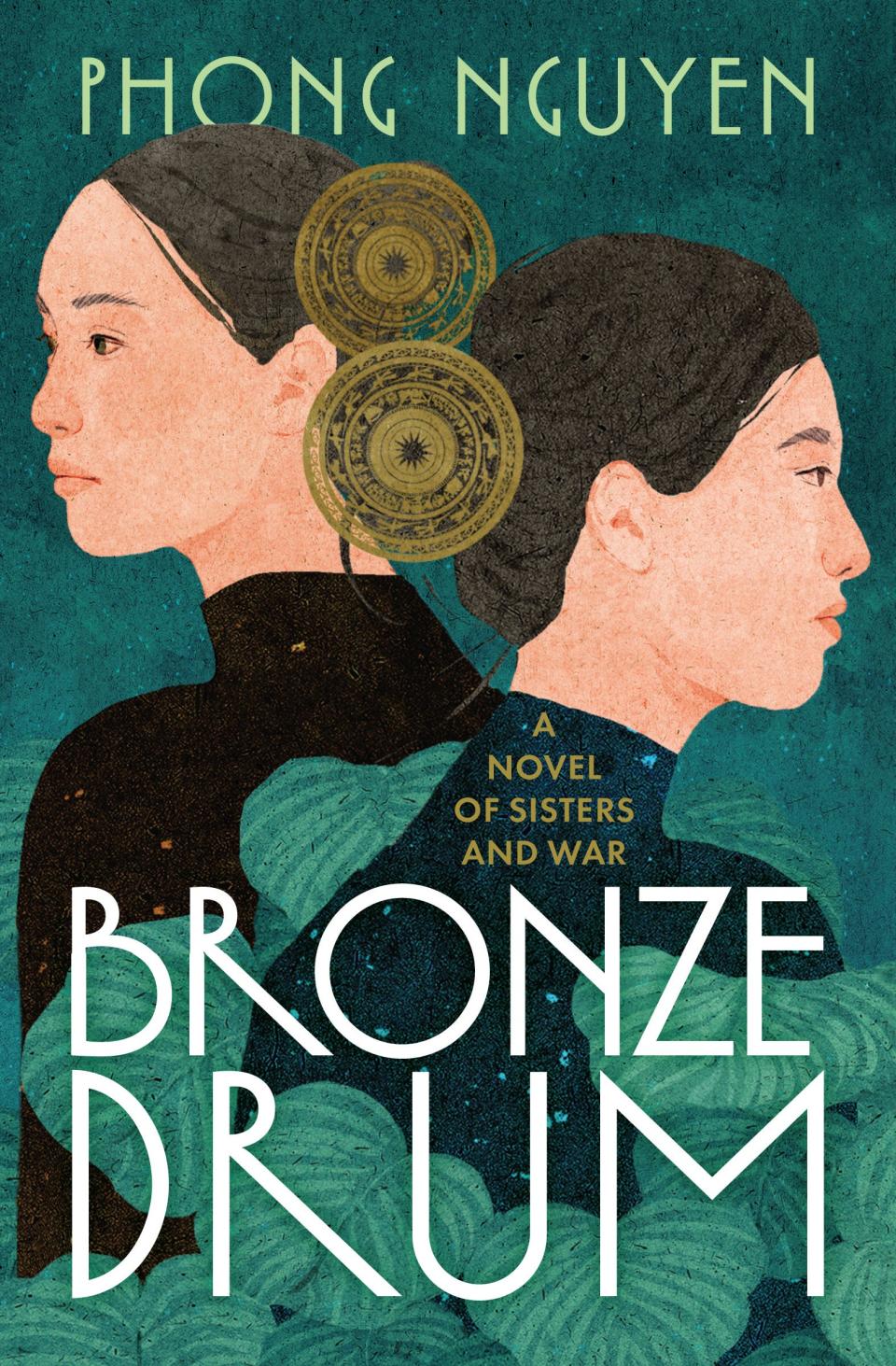How Columbia author Phong Nguyen brings an ancient Vietnamese epic to life

The best stories grow over time.
Some bend the direction of myth, snowballs rolling downhill to gather detail and color. Others shape the heart of a people or place the way water weathers a landscape.
In his new historical novel, University of Missouri professor Phong Nguyen tells a story that does both. Out this week, "Bronze Drum" is a work created in the spaces between epic and character study, prevailing myth and authentic movement.
"Bronze Drum" tells the tale of two real sisters — nobles Trung Trac and Trung Nhi — who enjoy a relatively unbothered existence in first-century Vietnam, despite living under the thumb of Han rulers.
Spurred by threats to their people, and violence visited upon their closest circle, the sibling duo rises to meet the moment, forming an army of Vietnamese women and taking their fight to the Han.
"Bronze Drum" is an origin story of sorts — detailing events that forged the Vietnamese spirit, initiating the country's independence centuries before its arrival, as Nguyen relays on early pages. It's also a love story, describing hearts drawn together in passages of lyrical prose. And it's a revenge story, though quite unlike any Nguyen has ever known.
The Trung sisters have existed at the edges of the author's imagination since childhood, their story part of the Vietnamese cultural fabric Nguyen's father handed down as a living inheritance. Nguyen wanted to share the story with others, but waited for desire and readiness to meet.
"I needed to write lots of other books in order to feel up to the task. It’s a big-canvas story," Nguyen said.
More: With 'Iguana Iguana,' Columbia poet Caylin Capra-Thomas offers one of 2022's best collections
A story of sisterhood
The Trung sisters' story is "entrenched" in Vietnam, Nguyen said, inspiring cultural artifacts from statues to comic books, and affecting its residents in both personal and national dimensions.
Growing up in New Jersey, Nguyen absorbed the story, then compared its arc to the action movies beaming from big and small screens — films that made giants of Jean-Claude Van Damme and Steven Seagal. Even as a youth, he recognized clear contrasts between these tales of vengeance.
"Instead of ending with the revenge on the perpetrator of the violence against the Trung sisters, it galvanized them toward a greater good" for their country's sake, Nguyen said.
Renderings of their story vary, Nguyen said, some favoring myth over historical detail — and vice-versa. Posing "questions big and small" to a University of Wisconsin scholar who studies Vietnam, Nguyen faced an abundance of unknowns.
While initially frustrated by what he could and couldn't vet, he embraced the advice of friends and colleagues, finding freedom in the ability to make more choices as a writer.
One reality was undeniable from the beginning, Nguyen said: The core of the story rested on the relationship between the Trung sisters.

"The thing I really clung to — I read how Trung Trac was more inclined to military strategy, and Trung Nhi was a better warrior," he said. "That seemed to imply a lot of other contrasts that would become accentuated in a sibling relationship."
Across his work, Nguyen defines characters by their "evolving set of desires." For older sister Trung Trac, the progression begins with the simple desire to be a good daughter; then "intellectual fulfillment"; and, finally, to "restore a sense of order to a world that had been thrown into what felt like an unnatural state of chaos," Nguyen said.
Trung Nhi is forever motivated by the pursuit of real independence, he said, but her ideas of who and what hinder such freedom change as the story progresses.
Nguyen reveals their story through a deft interlacing of voices and techniques. Seemingly simple details reveal the everyday beauty of living: "The idleness of a sun-warmed day and Phan Minh's banter, alternately earnest and playful, blended into an ointment that spread along the surface of her skin," he writes on an early page.
More: Columbia author's latest detective tale is delightfully dog-eared pulp fiction
The nature of nature itself is handled with quiet power. "The clouds appeared earthly, touchable," Nguyen writes in one passage. "They lumbered like water buffalo across the firmament. Soon, the wind gusted, and they began to stampede while the sky darkened and crackled with lightning."
The ineffable power of love is captured in elemental language too. "I think that the fire is a woman's passion, and the rain is a man's passion," Trung Trac says in a moment of true awareness.
And even the tragic, defining violence of a massacre unfolds like an epic poem, inevitable yet lyrical.
A storied history
Both like and unlike "Bronze Drum," much of Nguyen's catalog digs around the relationship between history and fiction.
2014's "Pages From The Textbook Of Alternate History" imagines other futures, and their ripples, for figures such as Christopher Columbus and Siddhartha. 2016's "The Adventures of Joe Harper" springboards acrobatically from Mark Twain's Tom Sawyer narrative.
When writing students approach Nguyen with a self-diagnosed case of writer's block, he prescribes an exercise. Stop trying, and pick up a book. When you find yourself talking back to the text, start writing from there.
This approach proves fruitful in his own work, especially while reading history, Nguyen said. His intention is not to improve upon the past, but to show how stories change with even what seem to be minor variances and choices, he added.
With "Bronze Drum," Nguyen isn't necessarily trying to complicate the legacy of the Trung sisters, but instead presenting a story "missing from the library of American writing," and one friends and professors didn't know as he was coming of age, he said. In this labor, certain strains emerge.
Early reviews reference the book's feminism, which, Nguyen said, is a product of two ages. The Trung sisters' legacy informs views of women in Vietnam today; the country doesn't possess the modern history of feminism often touted in the West, but owns a longer history of women in certain roles, such as combat, he said.
He began writing the book in 2016, with the possibility of Hillary Clinton becoming the first female American president. Writing through the moment allowed Nguyen to see how clearly the Trung story foils certain myths about female heads of state, including their perceived weakness on defense.
More: How a Columbia author sifted the legends behind Cat Power's 'Moon Pix' album
"Bronze Drum" also forms a thoughtful study of how we come to form our histories. Late in the book, Trung Trac muses on her family's true impact.
"They will say, not that we set the Lac Viets free, but that we realized their freedom, and showed them how," Nguyen writes through her voice.
History is more fully realized through books like "Bronze Drum" and authors like Nguyen, who recognize the degree to which all people and places are story-formed.
Learn more about the book, and Nguyen's work, at https://phongvnguyen.com/
Aarik Danielsen is the features and culture editor for the Tribune. Contact him at adanielsen@columbiatribune.com or by calling 573-815-1731. Find him on Twitter @aarikdanielsen.
This article originally appeared on Columbia Daily Tribune: Columbia author Phong Nguyen brings an ancient Vietnamese epic to life

